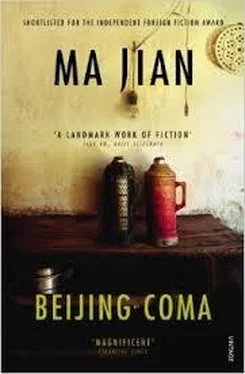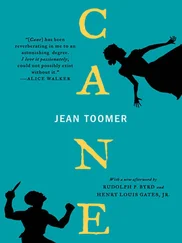‘… As soon as I stepped inside the Grand Hall of Xiantong monastery, I felt the Falun wheel turning just behind my navel,’ my mother tells him. ‘I wonder if Master Li Honzhi placed it inside me.’
‘Of course he did. It was he who led you to the temple and dispelled the karma from your body. All those who oppose Falun Gong will be destroyed in the end.’ Master Yao sits down on the sofa. I catch the smell of his scalp as he removes his hat.
I wish my mother would open a window. This flat is so stuffy. My mother’s room is barely larger than her double bed. There’s hardly any room to stand. My room is a little bigger, but it feels cramped and airless when the window of the adjacent balcony room is shut. The sitting room is a windowless passageway. But if you open the windows in the toilet and kitchen and keep the front door ajar, a small breeze can pass through it.
The rat poison Master Yao laid out a couple of weeks ago has killed all the mice in the flat. But my mother still hasn’t found the dead mouse that’s lying inside my father’s box of ashes. The smell of its decomposing corpse is disgusting. It makes me think of the frog I buried alive in the glass jar. Why does flesh take so long to disintegrate into dust?
‘There was a programme on Beijing TV attacking Falun Gong the other night,’ Master Yao says. ‘It’s a sign that the government has decided to suppress us. I wouldn’t be surprised if they’re tapping my phone.’
‘You must be careful,’ my mother sighs.
‘It’s too hot in here. Let’s open the door. Everyone’s having their afternoon nap now. No one will disturb us.’
My mother rams her shoulder against the heavy metal front door a couple of times, and finally manages to shove it open. A Taiwanese song floats up from a flat downstairs. ‘ I’m a tiny, tiny, tiny little bird. I try to fly, but I never get very high-igh-igh …’
‘The steel security doors they’re making now have little windows at the top that let air flow in and out,’ Master Yao says. ‘If you want to buy one, I can arrange to have it installed for you.’
‘I don’t want to make any changes to this flat right now. I’ll wait until Dai Wei’s situation is resolved.’ What she means is that she’ll wait until I’ve died.
My mother usually keeps the door shut, because whenever she opens it, the neighbours complain about the stench that pours out from our flat. They tell her it brings down the value of their property. Everyone in this building, apart from us, has taken advantage of the new policy allowing urban residents to buy their state-owned flats from the government. So our neighbours are homeowners now, with official property ownership certificates. But because my mother resigned from her job, she’s not eligible to buy the flat, and has to continue renting it from the National Opera Company. When the authorities demolish this compound, she will only get 10,000 yuan compensation, which isn’t nearly enough to buy her a flat in the new estate that most of our neighbours are moving to.
‘So you were here all the time! I knocked on your door earlier, but there was no answer. You’re sensible to stay indoors on a hot day like this. As soon as I step outside, my clothes become drenched in sweat. Then I have to take a shower when I get home, which wastes so much water…’
As usual, opening the front door has brought trouble. The woman from the flat upstairs, who is a sales agent for a fitness equipment company, wants to come in for a chat.
‘Sit down, sit down,’ my mother says reluctantly.
‘This tall gentleman here looks like a company director. Am I right?’
‘No. I used to be an accountant. I got laid off.’
‘I was laid off too. But I’ve turned my misfortune into good fortune. I work in direct sales now. I can make at least a thousand yuan a month, which is five times the subsistence salary my former work unit pays me. You look in good shape. I could recommend you to my boss, if you like. We sell exercise bikes. You get a 200-yuan commission for each one you sell. By the end of the year you could make enough money to buy yourself a house, or a car. It’s a fantastic scheme…’
This new neighbour has tried to persuade my mother to join her pyramid sales group three or four times already. Although my mother has never agreed, she’s picked out numbers from the telephone directory and phoned up strangers to test whether she could do the job.
‘The bikes are very expensive,’ my mother says. ‘And they take up a lot of room. You could only sell them to those rich people who live in the big new apartment blocks.’
‘But if people have some money to spend, they’d buy themselves a computer, not sports equipment,’ Master Yao says.
‘No, when people get rich, they start eating too much, and then they start wanting to lose weight,’ the woman says. ‘Fitness clubs make more money than computer training centres these days. You should look at our website and check out our products. This company has got a great future.’
‘I can’t afford to use the internet,’ Master Yao says. ‘It costs twenty yuan an hour. It would be cheaper for me to take a taxi to your warehouse and see the products in person.’
‘I like this movie star wall calendar you’ve got here. Look, this is the actress who did those TV adverts for diet pills.’
From a radio upstairs, a newsreader drones, ‘In advance of President Clinton’s historic visit to China later this month, President Jiang Zemin expressed his hope that the United States will conduct an honest and purposeful dialogue with China, and will take full advantage of the trading opportunities afforded by our nation’s growth…’
The world I used to live in has been transformed, like flour that has been baked into bread. I have to chew on it very slowly before I can recapture any sense of what it once was.
You are a passenger on a stricken plane, hurtling towards death at a terrifying speed.
‘The martial law troops have begun to force their way through the barricades!’ Wang Fei shouted into his walkie-talkie as he headed off with some students to the Liubukou intersection just west of the Zhongnanhai compound. I’d been there an hour before, constructing a roadblock of cement bollards and empty buses. The Beijing Students’ Federation had been urging students who’d returned to the campuses to come out onto the streets and help the citizens man the barricades.
Lin Lu ran into the broadcast station and shouted into the microphone: ‘This is an emergency! We need more students to go to the intersections immediately and help block the army’s advance!’ He then turned to Yu Jin and told him to take the few marshals remaining in the Square to the Jianguomen intersection in the east. He’d just received a report that an army truck there had been overturned and set on fire.
All the telephones lines we’d been using had been cut off, and most of the journalists and television crews had left the Square. The festive, carefree atmosphere of the previous few days had gone.
The announcements broadcast from the Beijing Workers’ Federation’s tent on the other side of Changan Avenue were usually drowned out by louder noises, but now I could hear their leaders calling out for Beijing citizens to join their Dare-to-Die Squad. ‘The situation has taken a grave turn for the worse. The military are tightening their circle around Beijing…’
‘Dai Wei, muster your marshals and set up a security line,’ Old Fu said. ‘The four intellectuals want to enter the Square and start their hunger strike. I’ve just found out that one of them is the Taiwanese rock star Hou Dejian. He’s a university graduate, so I suppose that makes him an intellectual. The crowds will go mad when they see him.’
Читать дальше












